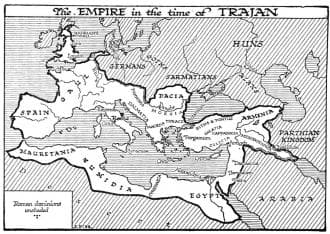Philanthropy in ancient times: some early examples from the Mediterranean
Philanthropy, as we know it today, in both its definition and practices was significantly influenced by ancient Mediterranean civilisations.
- Written by
- Sarah Bond
- Added
- April 02, 2011
Edited from the Free Science Encyclopedia
Today philanthropy is normally construed as love of mankind; a voluntary, practical benevolence towards others, but historically it has also been intrinsically tied to social hierarchies, the politics of city life, the proliferation of faiths, the making of laws, and the governance of states.
As early as the third millennium BCE (before the common era, or sometimes Christian era), evidence from law codes shows us that Babylonian kings decreed special punishments for the strong who abused the weak. Provisions such as these made justice and clemency hallmarks of nobility. This idea was exemplified in Babylonian epic poetry (in particular from theGilgamesh cycle c. 2000 BC) where verses retold the stories of misanthropic kings while celebrating generosity and self-sacrifice as vital steps towards civilization.
Around the same time (c.1800 BC), Egyptian sacred writings, such as The Book of the Dead, make it clear that successful passage to the afterlife depended on a lifetime record of benevolent acts towards the suffering. It was written that Egyptian deities expected any person seeking immortality to swear that they had never denied food to the starving, drink to the thirsty or clothing to the ragged. Many religious tenets would later be written decreeing that the faithful must also be charitable, which stemmed from philanthropy’s roots in antiquity society.
Greek models

Westerners owe the word philanthropy to the Greeks, who, since the fifth century BC ceaselessly elaborated on their idea of philanthropia. Etymologically, philanthropy means ‘the love of humanity’ and is generally believed to have been coined 2500 years ago by its use in the myth Prometheus Bound. In this mythic talewe are told how the primitive creatures that were created to be human at first had no knowledge, skills, or culture of any kind and so they lived in caves, in the dark, in constant fear for their lives. Zeus, the tyrannical king of the gods, decided to destroy them, but Prometheus, a Titan whose name meant forethought, out of his ‘philanthropos tropos’ or ‘humanity-loving character’ gave them two empowering, life-enhancing, gifts: fire, which symbolises all knowledge, skills, technology, arts, and science, and ‘blind hope’ or ‘optimism’. The two went together – with fire, humans could be optimistic; with optimism, they could use fire constructively to improve the human condition.
The new word, philanthropos, combined two words: philos, ‘loving’ in the sense of benefiting, caring for, nourishing, andanthropos, ‘human being’ in the sense of humankind, humanity, or humanness. What Prometheus evidently loved was their human potential—what they could accomplish and become with ‘fire’ and ‘blind hope’. The two gifts in effect completed the creation of humankind as a distinctly civilized animal. ‘Philanthropia’, loving what it is to be human, was thought to be the key to and essence of civilization. The Platonic Academy’s philosophical dictionary defined Philanthropia as, ‘a state of well-educated habits stemming from love of humanity. A state of being productive of benefit to humans.’ Philanthropia was later translated by the Romans into Latin as, simply, humanitas – humane-ness. And because Prometheus’ human-empowering gifts rebelled against Zeus’ tyranny, philanthropia was also associated with freedom and democracy. Both Socrates and the laws of Athens were described as ‘philanthropic and democratic’—a common expression, the idea being that philanthropic humans are reliably capable of self-government.
The Greeks also adopted the ‘love of humanity’ as an educational ideal, whose goal was excellence (arete); the fullest development of body, mind and spirit and the essence of liberal education.They revered the gods Hermes and Eros as especially philanthropic for the gifts of wisdom and desire they imparted to men. The Greeks had a further fascination with knowledge as a gift freely communicated to mortals by other wise men, which can be seen in Plato’s presentation of the philosopher Socrates, stating the philanthropic nature of teaching (Euthyphro,c. 400 BC). The love of learning and discriminating art patronage employed by the Persian ruler Cyrus the Great induced his Greek biographer Xenophon to praise the monarch’s supremely philanthropic soul (Cyropaedia,c. 380 BC). For centuries Greek subjects even began to address the emperors of Byzantium, ‘Your Philanthropy’. This title was doubly appropriate since, by the sixth century CE, a ‘philanthropy’ in Greek also meant the tax exemption Byzantine emperors regularly gave to their favourite charities such as hospitals, orphanages, and schools. The tax-exempt condition of many modern charities has its roots in this ancient practice and this type of privilege has long contributed to shaping various status hierarchies within Western societies.
In Greek cities, many forms of philanthropy combined to strengthen urban culture. Most important were the civic duties rich men assumed either voluntarily or under heavy peer pressure. These responsibilities obligated wealthy citizens to subsidise personally the cost of temples, city walls, armouries, granaries, and other municipal amenities promoting inhabitants’ common identity and welfare. Prominent citizens vied with one another in the performance of these indiscriminate gifts to show the superiority of their own civic virtue. Personal vanity was a prime motive for donors, but rich citizens risked being ostracised by peers and plebeians alike if they failed to appreciate their wealth as a trust in which the community had a share.
Greek philanthropists showed a genius for converting their gifts into potent symbols of communal strength and solidarity. Groups of wealthy men regularly paid for all the equipment necessary to stage the great Greek dramatic festivals. Such gifts of theatres, scripts commissioned from leading playwrights, costumes, and actors shaped the physical and cultural environments of Greek cities, gave audiences memorable lessons in civility, and enshrined drama as one of the greatest media of collective artistic expression in the West.
Roman philanthropia

As conquerors, heirs, and cautious emulators of the Greeks, the Romans assumed more regulation of what they calledphilanthropia and believed it to be among the greatest obligations of their civilization. Influential authors like Cicero and Seneca composed manuals on the arts of proper gift giving and receipt. Seneca, tutor to the emperor Nero, emphasised that elite giving must generate gratitude between the vertical ranks of Roman society and argued that philanthropy rightly done formed the glue that held the Roman people together (On Benefits, composed c. 60 CE). Thus benefactors had to select appreciative beneficiaries carefully and choose presents capable of eliciting maximum acknowledgment from recipients. Heads must rule hearts in discriminate Roman philanthropy.
Roman rulers took this advice with emperors asserting exclusive rights to make choice gifts of baths, gymnasia, fountains, and gladiatorial games to the Roman population. The elaboration of Roman law aided less exalted philanthropists by giving legal status to trusts, charitable endowments, and mutual-aid societies. But the tendency for many donors to use such legal instruments for self-glorification, personally advantageous politicking, and the conservation of family wealth did little to help larger numbers of the destitute in growing Roman imperial cities. To the Romans, philanthropy also meant the proper conduct of diplomacy, special respect for foreign ambassadors, fidelity to sworn treaties, and generous terms of alliance offered to defeated enemies. The propagandists of empire cited these philanthropies as justifications of Roman imperialism and the superiority of Roman civilization.

The Classical view of philanthropy disappeared in the Middle Ages, but was rediscovered and revived with the Renaissance and came into the English language in the late 16th and early 17th century. Sir Francis Bacon in 1592 wrote in a letter that his ‘vast contemplative ends’ expressed his ‘philanthropia’ and his 1608 essay, On Goodness, defined his subject as ‘the affecting of the weale of men... what the Grecians call philanthropia.’ Henry Cockeram, in his English dictionary (1623), cited ‘philanthropie’ as a synonym for ‘humanitie’ (in Latin, humanitas) – thus reaffirming the Classical formulation.
In modern terms, there are four relatively authoritative definitions of ‘philanthropy’ that come close to the Classical concept: John W. Gardner’s ‘private initiatives for the public good’; Robert Payton’s ‘voluntary action for the public good’; Lester Salamon’s ‘the private giving of time or valuables…for public purposes’ and Robert Bremner’s ‘the aim of philanthropy…is improvement in the quality of human life’. Combining these to connect modern philanthropy with its entire previous history, philanthropy may best be defined today as, ‘private initiatives for public good, focusing on quality of life.’
This article is edited from the JRank Science and Philosophy website, with additions from Wikipedia. SOFII is grateful for this brilliant free resource.

















